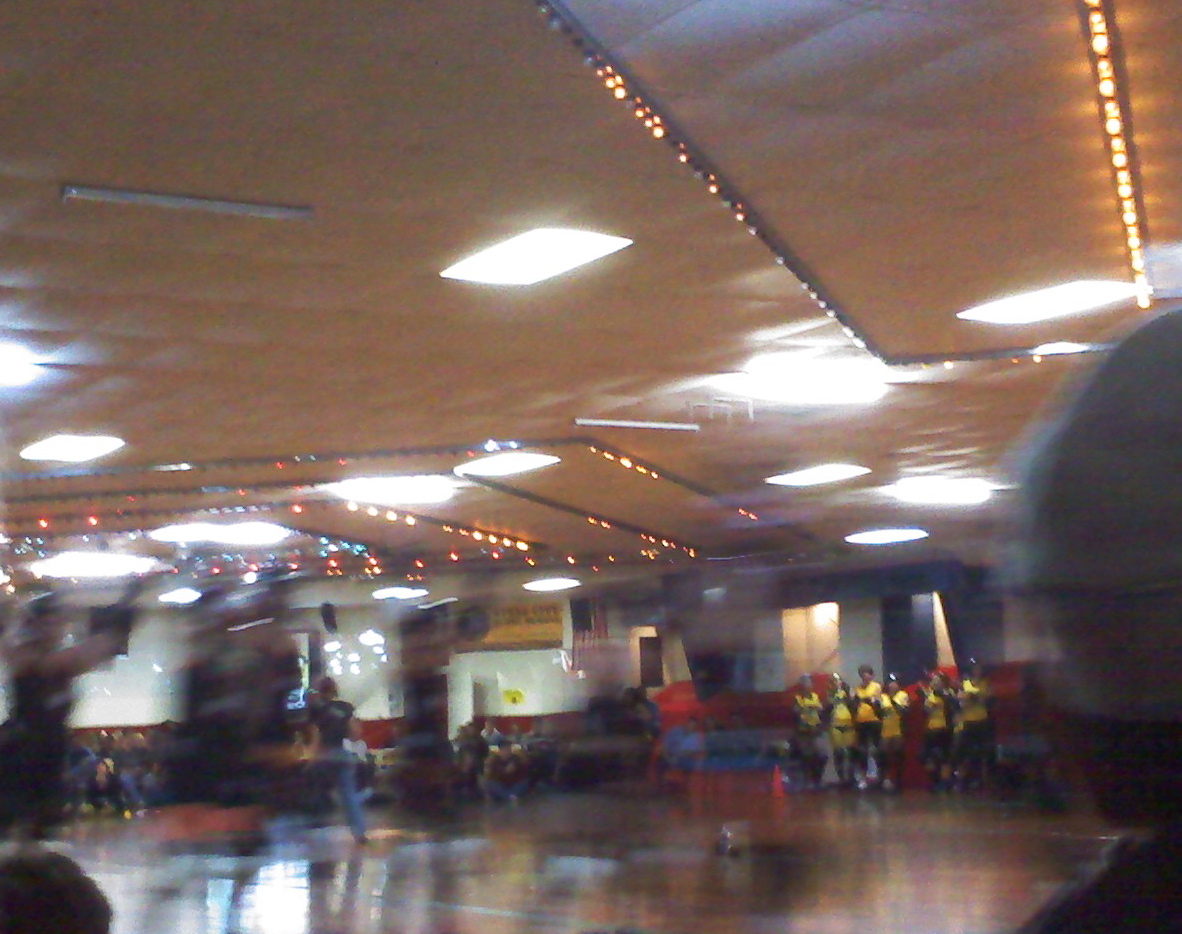Roller Derby Makes Me Brave
[All of these essays were originally published on my blog. I've collected them here for ease of reading. You can click on each title to access the original blog post and comments, and you can see all posts in the series here. Slightly different installments of some of these essays have also been published on DerbyLife.com.]
1) Roller Derby Makes Me Brave
In the spring of 2010, I attended my first roller derby bout and then wrote a blog post about it on April 22, 2010. On March 21, 2012, almost 23 months to the day of that post, I finally strapped on a pair of skates and hobbled around a rink for half an hour. Those 30 minutes were a long time coming, and they've catapulted me into a new adventure. I'm going to be chronicling my journey from couch potato to roller derby badass. You're invited to roll along with me.
Romp n Roll rink; shot with cell phone camera
April 2010 -- Roller Derby is the great social equalizer. I am not even kidding. It is a land of freaks and geeks, of unshaven blue-collar men and shaven young people of indeterminate gender, of interracial couples and Girl Scout troops. You can be yourself at Roller Derby, and it's all good.
I wasn't sure how I'd feel at my first roller derby bout. (that's what matches are called: bouts). I wondered if I'd be cool enough, hip enough, gritty enough to fit in with the crowd. I arrived early at the Romp & Roll rink in Glenshaw, hoping to snag one of the few tickets available at the door. On my way to the entrance, I passed a cluster of men and women hanging out near the side door ― the door that the insiders used, the entrance that means "I'm with the team." They were dressed in biker black and were smoking cigarettes. Suddenly it seemed like my outfit (dress-over-jeans and a little lime-colored cardigan) that feels so funky in my suburban neighborhood marked me as a newbie, a roller derby virgin, a goodie-two-shoes who couldn't skate with the big girls. But I kept walking, head held high and eyes averted. I glanced to the left to see if anyone had noticed me, and here's what I noticed: Nobody gave a damn.
Here's what happened while I waited in line, which was a microcosm of the rest of the evening: I struck up a conversation with a man who reminded me of my father's factory worker friends. I told some young hipster guys that they were in the right line for tickets. A geeky guy bummed an American Spirit cigarette from one of the hipsters, and then had to ask for a light, too. A young woman in a wheelchair told the small crowd, "If they say the tickets are sold out, you all just pretend you're with me and I'll look real sad!" My husband arrived and got in line with me, and he didn't look out of place, despite still wearing his work clothes (dress shirt and slacks) and being the only non-white person in sight. No one batted an eye, because damn, this was roller derby, and we were all here to have a good time.
At this point in the story, maybe you're like: What's with all the judging-books-by-their-covers, McG? All I can say is: Why is everyone calling me McG all of a sudden? And also: Appearance is the first thing we see, so yeah, I'm a bit of a book-cover-looker. But I'm less concerned with judging others than of being judged. And now, maybe you're like: Whoa! Insecure much? And I'm like: Well, yeah, occasionally I'm insecure despite all my efforts to be a strong, confident, self-actualized person, maybe-just-maybe I sometimes worry in new situations. Just because I act like I'm all self-possed and brave doesn't mean I'm not shy and cumbersome on the inside, okay? And now you're like: Um, okay, chill out and stop putting words in my mouth, because, dude, I'm just trying to read about roller derby. And now I'm like: Frickin-a!
Inside Romp n Roll, the joyful melange of people expanded. I didn't feel out of place at all, because it was impossible to stick out. Goths and punks and bikers co-existed peacefully alongside whitebread families with adorable toddlers. There was no baseline for normal here, which meant that everyone got to be beautiful and wonderful in their own way. If only the rest of the world were as integrated as the crowd at a roller derby bout! Dare I say it? Roller derby is the key to world peace.
I think roller derby may also be the only thing (besides sex) that could convince me to enjoy sweating. I generally don't like to exercise or do anything that requires me to catch my breath. I'm a sedentary sort of person, but I have secret dreams of speed. I used to fantasize about flying around the ice as a figure skater, but now I'm hooked on old skool roller skates. The spandexed people of California can keep their inline skates. Give me a shoe with four wheels, one at each corner of my foot.
I watched those women skate and block and fall, and I wanted to be one of them. I was so quiet that my husband asked me if I was tired, but I was focused, intently studying the techniques of the game. I've never played or cared about a sport in my life, but there I was, trying to figure out if I'd be a better blocker or jammer.
Earlier that day I had lunch with a former co-worker. When I told her that I want to be a roller derby girl, she replied, "You're too nice for that.
I said, "Oh, I have a dark side."
I'm not the kind of girl to wear fishnet stockings, to have tattoos or piercings, to know how to move my body in time to the rhythm of music and skates, to be strong and confident in my own skin. But I could be. I tap danced for eight years as a kid, and I'm sure a set of fishnets came with one of those costumes. On Saturdays my dad would drop off my friends and me at the roller rink, where I skated with all the bad-assery I could muster at eleven-year-olds, moving in time to Tina Turner's "What Love Got to Do With It?", round and round that rink like I owned it, even though I had no idea what the song was about. In high school I sported a fake nose ring, and the only thing stopping me from getting real piercings and tattoos is my body's rejection of foreign bodies as evidenced by two disastrous attempts at pierced ears.
Sometimes I feel like 11-year-old me had more bad-ass potential than 34-year-old me does. Knowledge may be power, but innocence has a force all its own. I don't know if I'll ever try out for the roller derby team, given the practicalities of my knee, which makes a grinding sound when I bend it, and the fact that the rink is an hour from my house. But there's a bout next month and a general skate before that. I plan to be there, with or without fishnets.
2) 20 Years, 2 Skates, 1 Fall
You arrive at Hot Shots Sports Arena on a warm Wednesday afternoon in March, half an hour before the open skate ends. The roller derby team you're thinking about joining practices here on Sundays, but you want to make your maiden voyage alone. You haven't been on a pair of roller skates since you were 16 -- and that was 20 years ago. Thirty minutes is plenty of time for this second first time; you're not sure your legs will hold up much longer than that.
You wiggle your feet into the teal and orange rental skates, pleased with the serendipity; the skates match your teal and brown striped socks. You're sitting on a bench against the wall, several yards away from the entrance to the rink, which is more accurately called a court, since it's enclosed in plexiglass and usually used for roller hockey. Out here on the bench, the floor beneath your feet is polished concrete, hard and smooth. You lace up. A little pixie of a girl, probably about seven years old, whizzes past on inline skates. You envy her.
You wish there were a bench closer to the court entrance. You tilt onto your toe stops, hold on to the bench, twist and rise to a squatted position. Now you're standing on the polished concrete floor, and oh dear goodness, it's like ice. You keep all eight wheels on the floor and use the wall to propel yourself. You glide ever so slowly toward the door.
There are two courts in Hot Shots. Some kids are playing on the one to your left, but yours is empty. Here's the plan:
Try to stay on your feet.
Back and forth along a 20-foot section of wall.
Nothing fancy, nothing fast. (Not that you could do either if you tried.)
You notice a few women, mothers of the kids playing on the other court, glancing back at you. You wonder if they envy or pity you. You want to shout to them in a Rock-n-Roll voice: "Roller Derby, Baby!" (You don't.)
Face the wall, hold onto the ledge. Wiggle your toes. Look around. Shuffle your feet back and forth just a little bit. Now, turn so the wall is to your side. Push off with your hands, coast, stop with your hands on the ledge.
Do this for five minutes, maybe ten. Your legs will start to ache almost immediately. Your feet may start to cramp. You'll realize you have the beginnings of an ingrown toenail on the big toe of your right foot.
Next, try a little bit of actual skating. Lift a foot and use it to push off. (You can stay close to the wall.) Lift the other foot and push forward again.
Around the 15-minute mark a muscle memory courses through your body and you merge with the 11-year-old version of yourself who used to do this on weekends. Your mind is shocked to realize that your legs and hips might have an intelligence all their own. Give yourself over to it. Listen for the rhythm. You hear Tina Turner singing "What's Love Got to Do With It?" even though there is no music playing in Hot Shots. Tina's voice is low and sultry, almost inaudible, but it's there.
Swing your hips to Tina.
Step, glide, step.
Step, glide, stop.
Turn. Do it again.
You've been on the skates for 20 minutes when you start to think about what that first fall will be like. You know it's inevitable; everyone falls at some point. You feel proud of your Zen-like acceptance of this fact, and just as you wonder if it would be better to get it out of the way so you don't have to --- BAM!!
Both legs go out in front of you, it's a long way down -- the fall is fast and slow at the same time, the way car accidents are -- to a straight and heavy landing on your ass.
Your 36-year-old ass, which is much heavier and much further away from the ground than your 11-year-old ass ever was.
Your spine absorbs the shock and you feel the impact travel all the way up into your neck, through the base of your head, and then shoot out the top of it like an orange firework of pain and triumph.
"Well, at least that's out of the way," you think.
You sit there for a minute or two, rolling your neck from side to side, marveling that you didn't break your wrist trying to catch yourself. For the first time in your life, you are acutely aware of your tail bone.
You get up onto your knees, and your head pops up above the court's ledge like you're a prairie dog. The women look back at you again. You realize you're going to have to stand-up while wearing these skates. You need to get back on this horse, of course. Tina Turner didn't let anyone keep her down, did she? You knee-walk over to the wall, rest a minute more, and then pull yourself back up onto your toe stops. All eight wheel on the court.
Five more minutes, back and forth along the wall, still alone in the court. The big clock in the center of the sports hall hits 3:00 p.m. Open skate is closed.
Gently lower yourself toward the floor, sit down, and take the skates off in here. Walk back to your street shoes, which wait for you on the polished concrete underneath the bench. When your tail bone makes contact with the bench you wince just a little.
You're proud of yourself. Really, really proud. You think Tina would be, too.
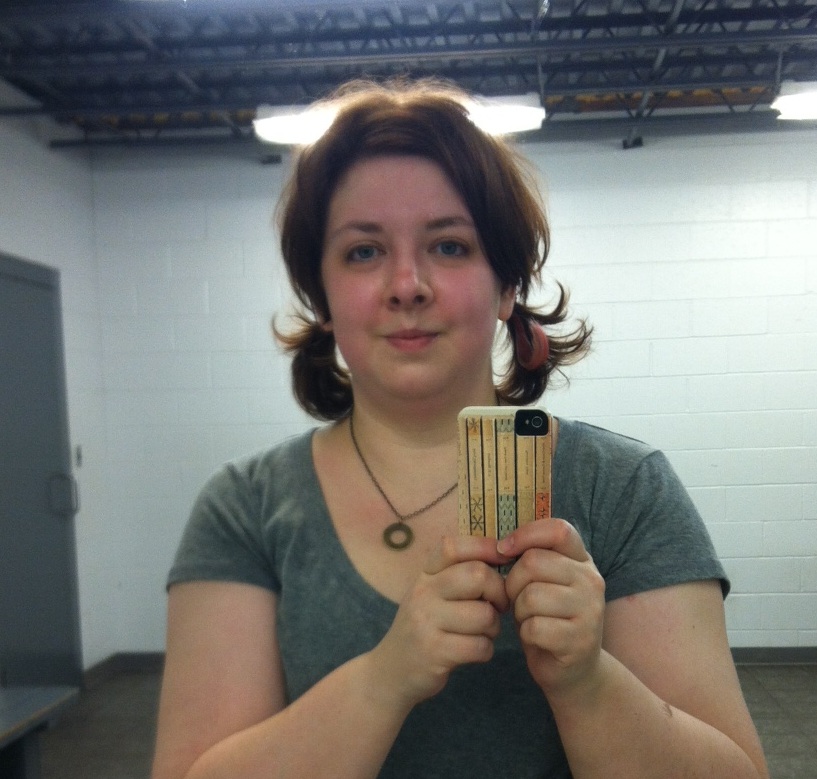 me (bruised, sweaty, and proud) after my first skate in 20 years
me (bruised, sweaty, and proud) after my first skate in 20 years
3) This New Way of Being
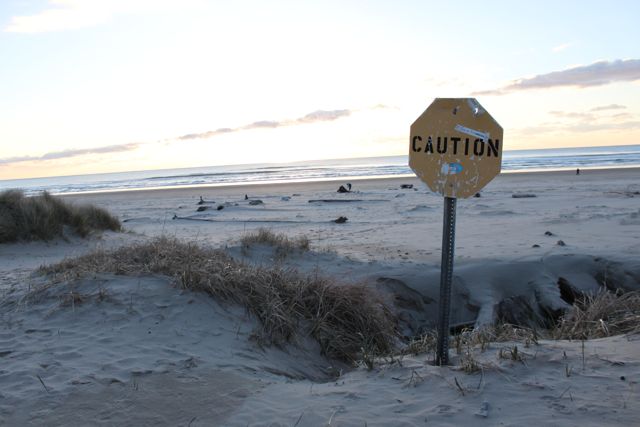
Thirty-six years and I've barely inhabited my body, but a bruised tailbone pulls one's attention down into the seat of a self. My body. My tailbone. Nerves and pain at the base of my spine, a flinch and quick "eesh" of air sucked in through teeth every time I sat or stood or shifted.
I fell because I was roller skating. Lured onto wheels by the siren song of Roller Derby. I fell because I was trying to be brave. I fell because I was tired of being so careful in my everyday living.
I've never played an organized sport, never been one to willingly break a sweat, and I've never liked the saying, "No pain no gain."
Thirty-six years, and what do I know of this body?
I don't engage in physically high-risk activities. At most, my lifetime accumulation of injuries have been minor: Skinned knees, paper cuts, bruises (sometimes in strange places) that I can't recall causing. A slip and fall on ice. The worst of anything has been my ankles, each one severely sprained multiple times, starting with a fall in eighth grade gym class. A torn ligament in college, a stupid (sober) fall running around campus before graduation. Never broken a bone, but friends would (do) call me clumsy, accident prone.
It's not a label I think much about. It just is. Until it's something else.
Advil and ice helped the pain, but there wasn't anything I could take to fight off the confusion and fear that burbled up with each dull ache and stab.
I wrestled with the tension that vibrates between between pride and shame. So proud of myself for getting on skates, for falling and getting back up. So proud! And so ashamed for taking a risk and getting hurt. I hid my guilt behind a thin veneer of bravado and practical pronouncements: "It's not so bad. There's not much you can do for a bruised tailbone except rest it." That week was uncomfortable, not just for my backside, but for my inner compass. I was learning to look at the world through a new lens, the lens of I took a risk and got hurt, but that doesn't mean I'm stupid or bad or irresponsible.
This was a new way of being in the world. If you played sports as a child, you may not understand this. If you are accustomed to taking physical risks, you may not comprehend. But if all your life you've been bundled up in...
Play it safe
Be careful
Take it easy
...then you may understand this. You may comprehend the profound nature of this shift.
All my life I've been afraid of getting hurt.
All my life this tension between desire and fear.
No sex before marriage. No sky diving. No driving too fast or without a seat belt. No drugs. No excessive drinking. No. No. No.
I've bubble wrapped myself in worry.
The day I stepped outside of that soft bunting, the bubble burst. An epiphany of the obvious: Sometimes people do things for fun that can hurt them. And this is not wrong. This is an acceptable way of being in the world.
At age 36 I was learning what most 10-year-olds know. Kids who play sports learn these lessons about their bodies, their limits, their capabilities at a young age. They learn how to get hurt and how to heal. How to get hurt again and still not fear. Here I was, approaching (or perhaps already at) middle age, navigating, for the first time, this new way of being in the world. This new way of being in my body. This new way of being me. This new way of being. This new way. This.
4) My Shadow Self
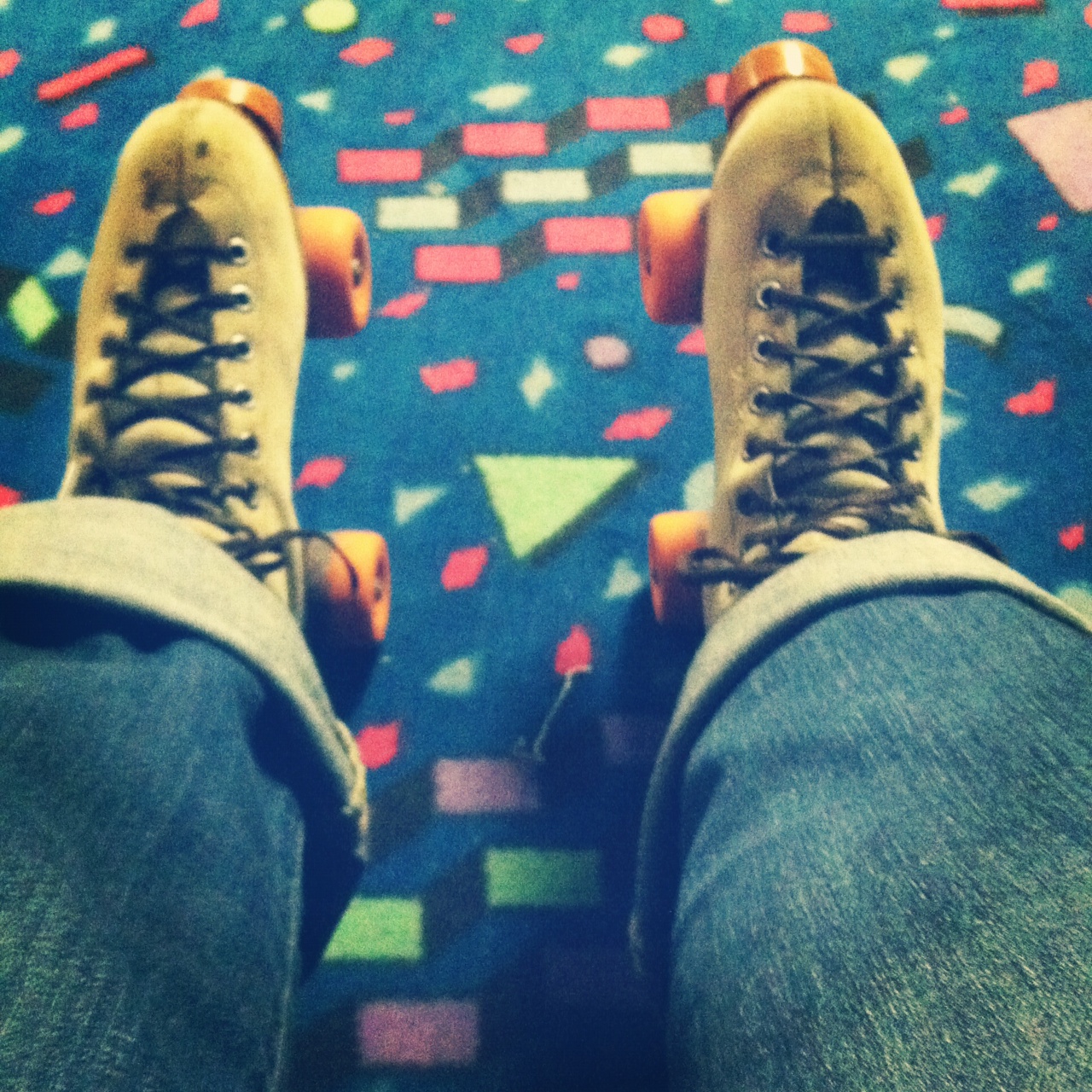 I saw the flyer near the door of the local coffee shop: Roller Derby is coming to Westmoreland County! A shot of espresso-scented adrenaline hit me. Roller derby! Here!
I saw the flyer near the door of the local coffee shop: Roller Derby is coming to Westmoreland County! A shot of espresso-scented adrenaline hit me. Roller derby! Here!
It had been nearly two years since I'd attended my first bout, and as alluring as the idea of derby had been, I knew I wouldn't commit to the 80-mile round trip to the rink where Pittsburgh's Steel City Roller Derby practices and plays. So the idea of becoming a roller derby girl simmered in the back of my subconscious, always on the periphery of desire, a shadow identity just out of reach. But here was a reminder of my shadow self, staring back at me in black and white. I tore off one of the flyer's paper fringe strips printed with an email address, and headed out into the February cold to my car.
That night, I sent an email asking for more details. The league organizer emailed back. The first official practice was happening that very week. I didn't go. I didn't go the next week, or the next. My shadow self kept telling people that I was going to try roller derby, but the other half of me didn't really believe it. I kept saying it, and kept putting it off. It took me six weeks to work up the nerve to get on skates. And even then it wasn't at a practice, but in an empty rink where I could shuffle and fall without anyone seeing. I wish now that I had gone to that first official practice, that I had let my desire make me brave sooner rather than later. In roller derby you learn how to stay in derby stance so you have less chance of falling, and you learn how to fall (forward) so you won't hurt yourself. By going it alone and trying to protect myself from the emotional discomfort of being awkward in front of strangers, I fell backwards -- and badly.
With a seriously bruised tailbone and an inflamed sense of fear, I waited another week and a half to get back on the proverbial eight-wheeled horse -- still not at an official practice, but at a Saturday night open skate that some of the derby girls frequent. I emailed the league founder ahead of time to say I'd be there, put on my most badass tee-shirt underneath my clothes, and made myself go.
That night I made it around the rink 10 times without falling. Not 10 consecutive times, but 10 times nonetheless. I spent the first hour skating from wall to wall in the miniature kiddie rink in-between sitting down to rest my legs. When one of the girls saw me standing on the edge of the main rink, watching people zip around with ease while I calculated my chances of successfully joining in, she skated over and talked me out onto the floor. We skated four slow laps before my legs burned with the effort and sent me back to my seat.
Those roller derby peeps gave me many things that night, whether they knew it or not. One offered me much needed encouragement. Another let me wear her knee pads so I could try a few laps without so much fear of falling. Several others ll chatted with me, which is a true gift when you're the new girl. Somoeone offered to give me an old pair of skates that she'd bought at a flea market. I stayed until the rink closed at midnight and then joined everyone at Eat'n Park for a late night snack.
After that, I drove the two of us home, me and my shadow self. I needed some rest; my first practice was coming up in two days.
5) The First Practices
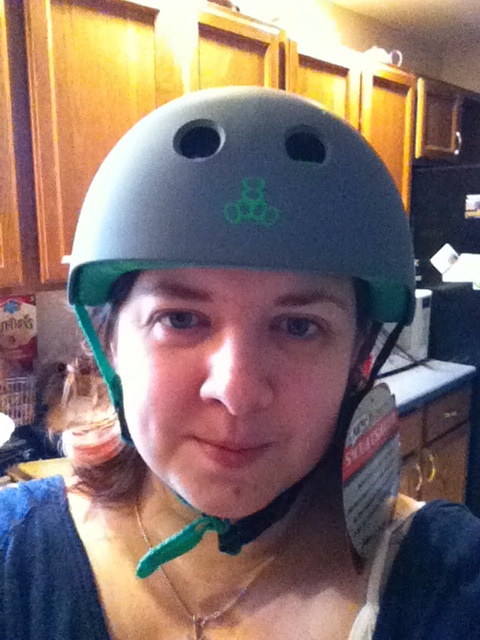 me in my new helmet, straight out of the box
me in my new helmet, straight out of the box
On the evening after April Fools' Day, I showed up at the practice rink with nothing but a knot in my stomach and what I imagine was a fresh-meat-in-the-headlights look in my eyes. This was no joke.
As promised, one of the women had brought me a pair of Cobra skates that she'd bought at a flea market. She'd paid $2.00 for them. I gave her $2.50. Compared to good skates, these were awful, but they were an enormous improvement over the rentals I'd been using, and I was thrilled to have them.
Since I didn't have any protective gear for that first practice, I didn't do much but skate around and watch the other girls do drills. By now I was staying on my feet most of the time, which was a considerable improvement, given that just three weeks earlier I could barely stand on wheels. But by the end of that first practice, going from standing to skating proved to be a problem. My brain told my body to move, but my feet apparently didn't get the memo. My upper body swayed forward while my legs stayed still, and down I went on my left knee.
In that moment I vowed that I wouldn't get on roller skates again without knee pads. So by the next practice a week later, I had the full monty of gear: knee gaskets, knee pads, padded shorts, elbow pads, mouthguard, and helmet.
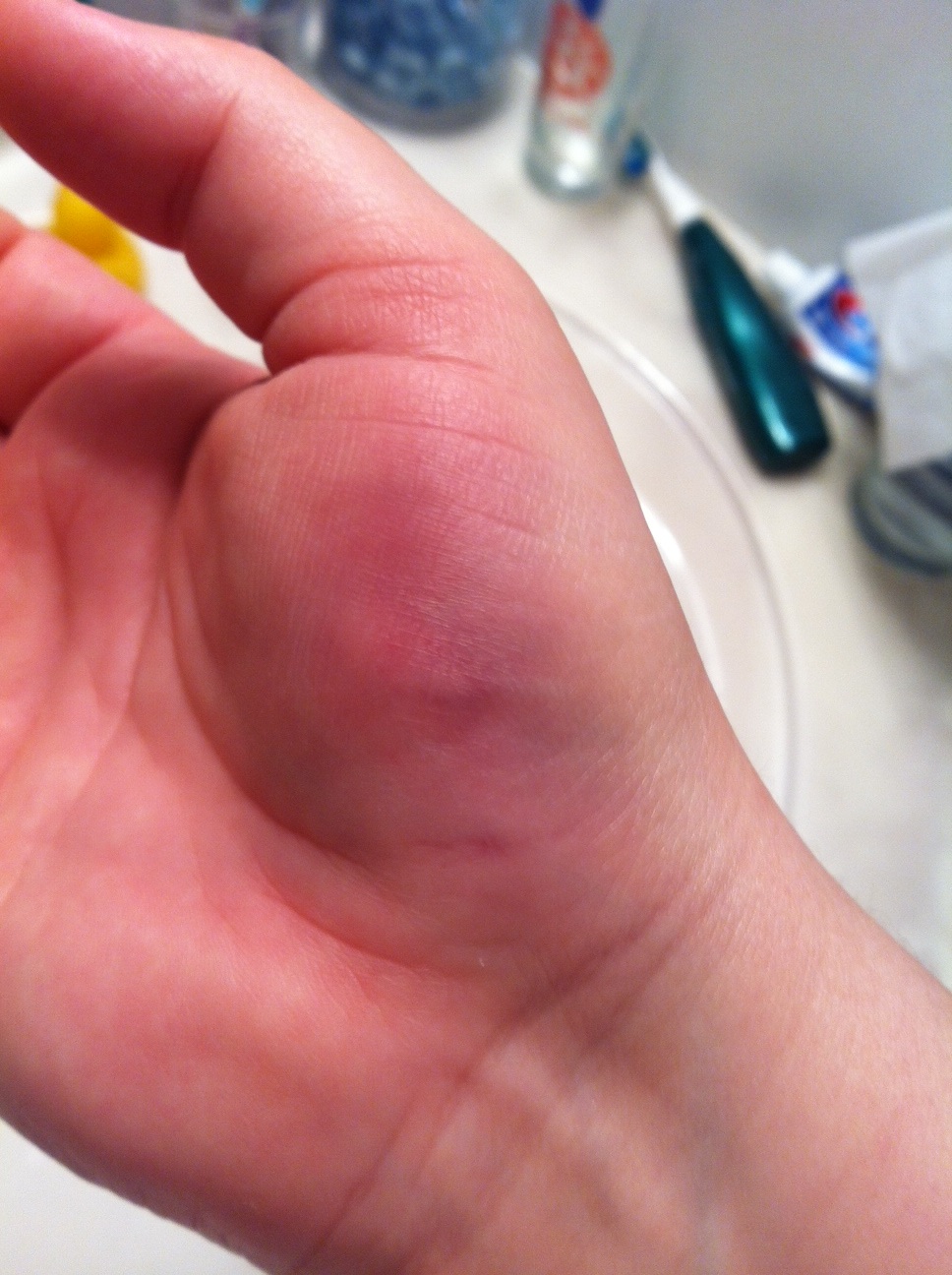 the palm bruise, one week later
the palm bruise, one week later
Well, I had the full gear monty minus one thing: Wrist guards. The pair I'd ordered online were too small and had to be exchanged. I didn't have them in time for that second practice, but I skated anyway. This was a mistake, because I fell and slammed my palm into the court. And it was in that moment, of course, that I vowed never to skate without knee pads and wrist guards.
By practice number three I finally had every single piece of gear that I needed. This meant that I could participate on a whole new level. And this made my third practice feel like my first.
We started that practice with a falling drill. Knowing how to fall well is a key part of roller derby. I don't know if there's any other sport in which "Nice fall!" is meant as a true compliment. You feel smart and powerful when you fall well. It's not that you want to fall, but you have to accept that it's going to happen, and you need to know how to do it as safely and painlessly as possible. Plus -- and this is the real kicker -- you need to not fear it. This mental aspect is much harder to master than the physical aspects of falling safely.
Strap eight wheels onto your feet, and everything in your body and mind screams at you: Don't fall! For the love of your beautiful bones, don't fall! You must overcome this. You have to trust that all of this gear you're wearing will work if you just follow the instructions.
As I stood in the drill line, realizing that I was going to have to execute a physical activity while a bunch of other women watched, everything in my mind and heart screamed at me: Don't do this! For the love of your pride, don't do this!
my $2.50 Cobra skatesWhat terrified me more than the idea of learning how to fall was the idea of other people seeing me learn how to fall. I have spent my entire adult life avoiding situations in which I might make a physical fool of myself. Yet here I was, a grown woman engaged in a voluntary, recreational activity, and I felt like the chubby, out-of-shape girl in eighth grade gym class waiting in line for one of the stations of the President's Physical Fitness Test. Do you remember those? I hated gym class in an average week, but my loathing and level of humiliation reached a new level during testing time. I don't think I ever failed the test, but I certainly couldn't do enough pull-ups or sit-ups to feel good about myself. I didn't run fast, and I couldn't run for very long without getting winded. I think I managed to do fairly well on the standing long jump, but that was little consolation for my overall mediocre performance. The worst part was having the other girls watch while you tried to execute the task. I don't remember anyone ever mocking or insulting me, but they didn't have to. I was doing that silently in my head all by myself.
We grow up, we change. We try new things, we shift perspectives. We get brave, we get hurt. Decades pass, and we're not the same people. Yes, all of these things are true, but we're also still 12-years-old, stuck in the purgatory between childhood and adulthood, old enough to know better and too afraid to know how. (Child self, meet shadow self.)
Everyone else skated out in groups of four. Skate, fall, slide. But there was an odd number of us that night, and instead of adding myself to a group, I ended up having to go by myself. I felt sick. I felt the kind of panic that makes you give-up before you try. The back-down-the-ladder-on-the-high-dive panic. The sing-too-softly-on-the-choir-solo-auditions panic. The turn-your-head-the-other-way-when-he-tries-to-kiss-you panic. The I-want-this-so-badly-I-can-hardly-stand-it panic.
Sometimes the shadow self triumphs. Eventually you step off the high dive, sing your heart out, close your eyes and soften your lips. Eventually you skate, fall, slide. And no one laughs or points or shakes their head. The next group lines up, and the next, and then you again. Skate, fall, slide. It looks easy, but there's not much in the world that's more difficult than letting yourself fall and getting back up again, no matter who's looking.
6) Forgetting to be Scared
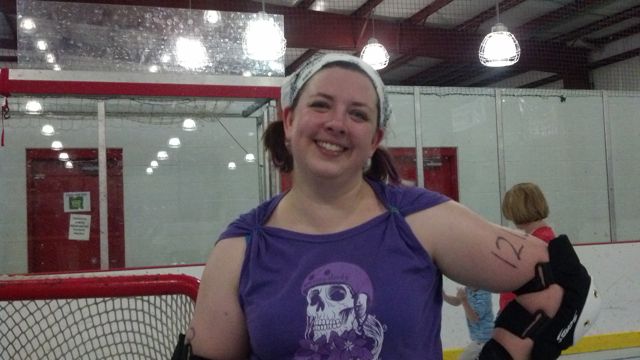 me after my first public roller derby scrimmage as part of westmoreland roller derby's violet femmes home team
me after my first public roller derby scrimmage as part of westmoreland roller derby's violet femmes home team
The Friday after Thanksgiving I felt more like the girl who sits on the couch in her pajamas and favorite soft-as-a-blanket cardigan, drinking tea and reading than I felt like the girl who shimmies into a pair of black tights, laces up her roller skates, and straps on a helmet to skate in an oval and knock down similarly dressed girls. But by late afternoon I had pulled my post-Thanksgiving ass off of the couch, showered, applied more eye makeup than I normally wear, hiked my tights up under a black miniskirt, and headed off to Westmoreland Roller Derby's Black Friday Bout.
This was my third public scrimmage, and I realized that I'm woefully behind in telling you about how we got to this point in the Roller Derby Makes Me Brave saga.
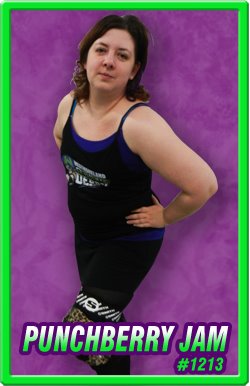 When last we left our derby heroine, Punchberry JAM, she had just attended her first practice in full gear. She was learning how to fall and how to get back up, literally and metaphorically.
When last we left our derby heroine, Punchberry JAM, she had just attended her first practice in full gear. She was learning how to fall and how to get back up, literally and metaphorically.
 That was last spring. I went to a few practices, and then to a few more, each time surprised with myself for sticking with this wild adventure.
That was last spring. I went to a few practices, and then to a few more, each time surprised with myself for sticking with this wild adventure.
Some time during the last six months I confided this truth to a non-derby friend:
"I haven't stopped being scared," I said. "I'm pretty much scared every time I stand up on skates."
"But you keep showing up," she said.
That's true. April turned to May turned to June, and I was still showing up -- and still skating on a terrible pair of Cobra skates. Their limitations were becoming obvious.
Now, let me be clear: Good skates don't exactly make the skater, but good skates do make skating easier. Wheeling around on a pair of toy skates with cheap plastic wheels and crap bearings while everyone else zooms past on bona fide speed skates can dishearten even the most determined derby girl. I couldn't do some of the most basic maneuvers, such as propelling myself forward with all eight wheels on the floor, not even when I moved my legs and hips as I was shown. I was skating twice as hard as anyone else and going half as fast. I hoped to the derby gods that these shortcomings were at least in part due to the shitty skates. But I worried: What if the real problem was me? The limitations of my body mingled with the limitations of my skates so that I had no idea which was which.
I needed new skates stat, but I dragged my feet on getting them. I was having trouble deciding on a pair, to put it mildly. Before derby I had no idea how many decisions one must make when buying roller skates.
What kinds of decisions? Read on if you care about that kind of thing, or skip the next paragraph if you don't.
Okay, so you wanna buy skates for roller derby. What kind of boot do you want? Leather or synthetic? What's the right size and style for short, wide feet with flat arches? Do you want nylon, aluminum, or titanium plates? What about the trucks? (Who knew there was something called a truck on a skate?) You could go with the standard 10-degree angle trucks or the swanky 45-degree angles. And what the hell is a "short forward mount," anyway? Then there are the wheels. Harder wheels go faster and are denoted by higher durometer numbers. (Go ahead, look up the word durometer. I don't think anyone but derby girls and plastic manufacturers use it.) Softer wheels have more grip and lower numbers. The bigger you are, the harder the wheel you can skate on, but if you're not very steady on your feet yet, don't go too hard or you'll slide around. And all of this depends on what kind of floor you'll be skating on. Concrete skates different than sport court skates different than wood. Okay, got your wheels picked out? Great. What about bearings for inside those wheels? Get at least ABEC-7, or go to Swiss bearings if you want really smooth rolling action. And you'll need some toe stops, of course. What about an extra set of laces? How about a toecap to protect the front of the boot from getting scuffed? Need any knee socks with your order? You got all that?
Yes, finally, I got all that. I tend to research things to death. I'm great at gathering and synthesizing information, but that process is also my Achilles' heel: I get trapped in analysis paralysis. For weeks I agonized over which skates to get. I wanted to make sure I bought the best possible ones for me. But something else was at play in my dilly-dallying: As long as I had crap skates, I could blame them for my crap skating. This was happening on a subconscious level, of course. (And as I've said, skates do not the skater make. I've seen derby girls skate like the wind in bad rental skates.)
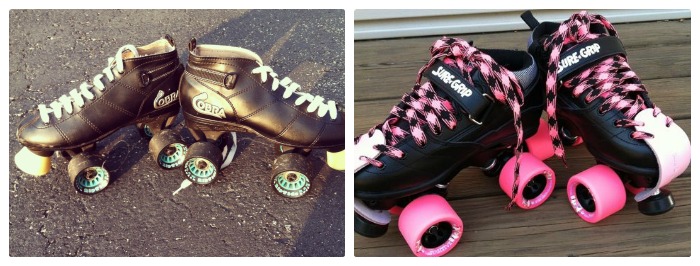 old skates and new skates
old skates and new skates
I wore the hell out of those Cobra skates. I wore them until something came loose inside the wheels and I was afraid to skate on them anymore. This happened right before I finally ordered a new pair, which meant I sat out a few weeks of practice while I waited for my shiny new skates to arrive.
(In case you care about this kind of thing, I got Sure Grip Rebel leather boots, Avenger DA45 plates, QUBE Juice Abec 7 bearings, pink Fugitive wheels, Carerra stops, pink-and-black plaid laces, and pink toe covers, though I'm now skating on black Radar Flat Outrageous wheels with Swiss bearings and have switched to black laces and black toe covers. Next up on the never-ending gear list is a set of Gumdrop toe stops.)
At the same time that I was waiting for my new skates, I was also spending several hours a week in physical therapy for my knee, which had decided to go haywire with all of this newfangled movement and exercise. And then I went to the west coast for two weeks in July, missing more practices and the league's first public scrimmage.
By the time August rolled around, my knee was on the mend and I had new skates -- and I was still scared every time I stood up on them. I hadn't skated much for about a month, and it showed. I wasn't exactly starting over, but I was scrambling to catch up and keep up. The good news is that I could now propel myself with all eight wheels on the floor, and although I was still slower than most of the others, I was definitely skating faster. I finally felt like I had all of the external pieces in order. Now I had to bring myself up to speed.
And that's where I am now: still working to bring myself up to speed. I go to practice twice a week and try to skate at least one other day. I've played in three public home scrimmages plus one closed scrimmage with the Ohio Valley Roller Girls.
This journey has been an up-and-down kind of adventure so far. I suspect that's how it will always be. I've lost a few weeks of training here and there due to laziness or new injuries. I've had nights where I've sobbed most of the way home after practice because I'm so frustrated with myself. I've also left practices bursting with joy and a kind of exhilaration I've never known before.
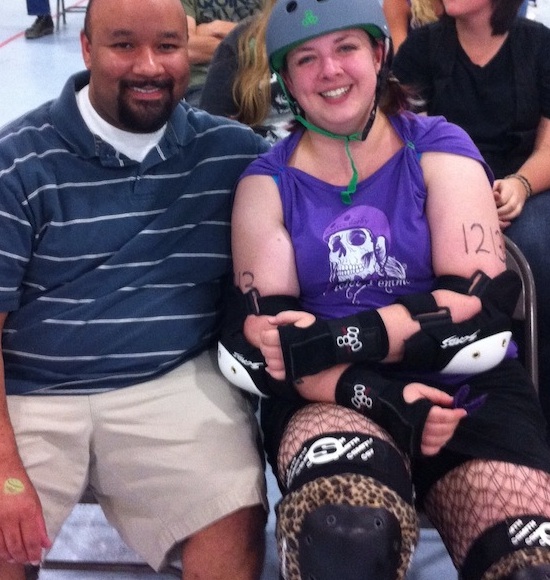 james & me at my first boutI'm still nowhere near where I want to be as a roller derby girl, but I'm not where I started, either. After the Black Friday bout, I wasn't feeling the best about my performance. But then at the after-party, the bench manager asked me how my knee was doing after its latest rebellion, and I could honestly say that it's much stronger than it's been. "That's great," she said. "I'm glad you can keep skating. You've come so far." I don't know if she had any idea how much I needed to hear those words (though it wouldn't surprise me if she did).
james & me at my first boutI'm still nowhere near where I want to be as a roller derby girl, but I'm not where I started, either. After the Black Friday bout, I wasn't feeling the best about my performance. But then at the after-party, the bench manager asked me how my knee was doing after its latest rebellion, and I could honestly say that it's much stronger than it's been. "That's great," she said. "I'm glad you can keep skating. You've come so far." I don't know if she had any idea how much I needed to hear those words (though it wouldn't surprise me if she did).
I've been making note (sometimes in my head, sometimes in my journal) of these little "wins," no matter how small they might seem on the surface: when a teammate says "good job"; when I don't fall down after a bigger girl shoulder checks me; when I do fall but get up quickly; when I figure out a strategy and communicate it to my team; when I master -- or even attempt -- a new skating skill.
I'm keeping track of these moments because one by one, they're helping me to be a little more confident. I get off the couch. I pull on the tights. I lace up the skates. I slap on the helmet.
I had good practice the other week. I was having a blast out there on the track. I felt strong and capable. And that's when it hit me: I had finally forgotten to be scared.
{photo credits: photo of me by james simpson; roster photo and photo of james and me by d.j. coffman, a.k.a. the secretary of skate; skates photo by me}
7) You Gotta Roller Derby That Shit! (Or, The Magic of Practice)
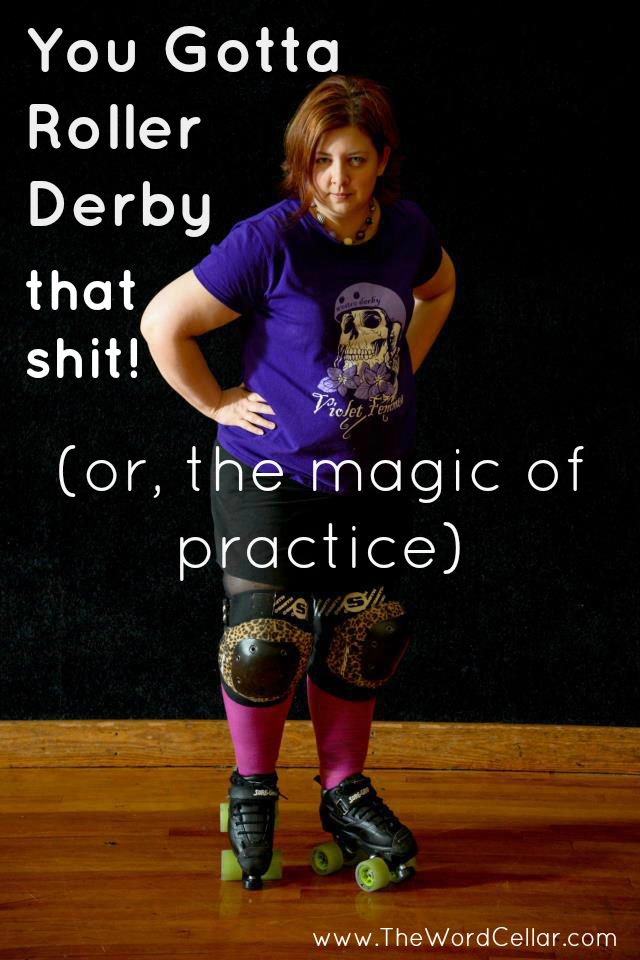 original photo by Jonathan Franks
original photo by Jonathan Franks
By the age of 36, I was used to doing things that I already knew I was fairly good at. It's not that I intentionally avoided new experiences or didn't want to learn new skills, but I had a pretty solid idea of where my natural talents and interests resided, and I tended to stick to those neighborhoods, which were populated with things like reading, writing, storytelling, teaching, and cooking.
Then I entered the world of Roller Derby and hot damn, this was a new part of town! I've written before about how I'd never played a sport, how I didn't like to sweat, and how I hadn't roller skated for two decades. Beyond the physical challenges, playing derby has meant some huge shifts in my mindset and perceptions of myself and what's possible.
One of those realizations has become my new mantra: You gotta roller derby that shit!
Let me explain.
Logic and experience tell me that the more I do something, the more I'll learn about it and the easier it will become. Although I knew this theory should apply to roller derby, I secretly doubted that it would hold. Every time I bemoaned my lack of skill and my slow progress, my husband, who grew up playing sports, told me that if I continued to go to practice and work at it, my skills would improve. My rational brain knew this made sense, but I just wasn't buying it. I worried that I was hopeless.
Still, I kept showing up. And then there was that one time near the end of last season when I finally had so much fun that I forgot to be afraid. This season started off better than I'd anticipated, and I could finally see that I was improving. Even my league mates commented on my progress. I felt proud, but I worried that it might be a fluke of some sort. But week after week I felt stronger, more in control, and more at home in this once-foreign neighborhood. Finally I had a realization...
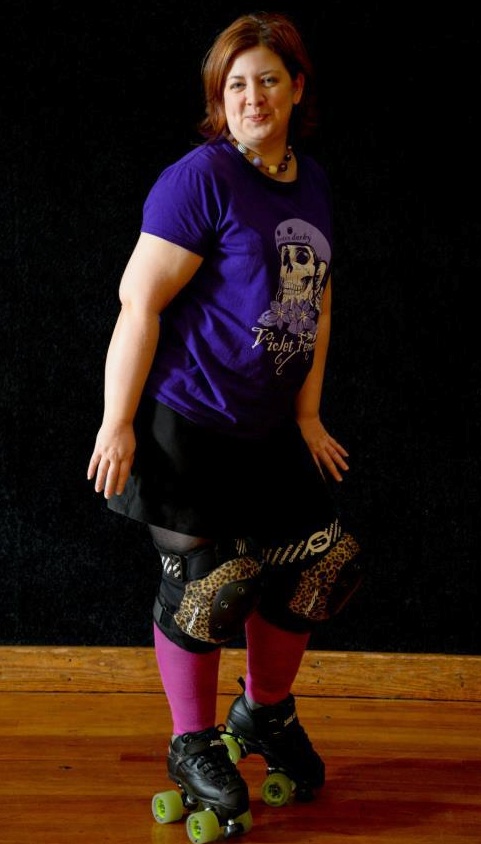 photo by Jonathan FranksHoly roller skates, it's true!
photo by Jonathan FranksHoly roller skates, it's true!
If you keep practicing -- even when you don't see immediate results, even after you've had to take time off for an injury, even when you have to leave practice and cry in the bathroom for a little while because your internal monologue won't shut the hell up with phrases like "You don't belong here!" -- if you keep showing up and doing the drills and trying the things you suck at until you suck less at them, eventually you'll make progress.
We all practice. Pianists play scales. Actors rehearse lines. Writers string together a lot of words that don't end up in the final draft. Chefs perfect techniques and dishes through repetition and tweaking. And athletes do drills and go to practice.
Of course, innate talent can make the going easier. But it can also get in the way. I seem to have little innate athletic talent, so I know I have to work hard to be fair to middling. On the other hand, I know I have innate talent as a writer, which means I don't always work at it as diligently as I should. It's easy to let myself skate by on my "good enough" setting when it comes to writing, because my "good enough" comes easier than some other people's "fair to middling" setting.
But good enough isn't great. And I no longer believe that you have to be born with the most talent to become great. I think it helps, but only if you decide to keep showing up and working at it. In other words, you gotta roller derby that shit.
I don't really expect to ever be great at derby, and I'm okay with that. I just want to be as good as I can be , and if that's just "good enough," that'll be great.
But I do want to be great at writing. And in order to do that, I need to show up and put in more work more often. I need to roller derby that shit.
This means sitting down to write at set times even if I don't feel like it, just as I go to derby practice at specific times each week, whether or not I feel like it that day. This means writing the same essay again and again, the way I keep practicing my turnaround toestops over and over. This means acknowledging the inner voice that whispers "What if this is as good as you'll ever be?", and then turning away from that voice and trusting in the magic of practice.
I've worked as a freelance writer and editor for more than nine years now. I have a graduate degree in creative writing. I've seen my words in print online and on the page. And yet I know I have miles to go in deepening my craft and honing my skills. I go through serious bouts of worry that I'm as a good of a writer now as I can possibly be, even though logic and reason tell me that this isn't true. What if I'm never any better than this? What if this is as good as I get -- and it's not great?
Yeah, what if? But what else is there to do about it but to "roller derby" the hell out of it, and trust the process?
8) Full Frontal Nudity & The Derby Girl Inside
 Last week after roller derby practice, I took a shower while my husband made dinner. I was in a good mood. It had been a good practice -- challenging, but fun. My blood sugar (which is prone to dipping too low) stayed steady, and I kept up fairly well with the drills. I worked on some jumps and transitions, skills that have scared me to death in the past, and I seemed to make some good progress on them. As a bonus, dinner was now being made downstairs while I stood in the hot water. I was feeling good.
Last week after roller derby practice, I took a shower while my husband made dinner. I was in a good mood. It had been a good practice -- challenging, but fun. My blood sugar (which is prone to dipping too low) stayed steady, and I kept up fairly well with the drills. I worked on some jumps and transitions, skills that have scared me to death in the past, and I seemed to make some good progress on them. As a bonus, dinner was now being made downstairs while I stood in the hot water. I was feeling good.
The shower faces a large bathroom mirror, which means I confront my full-frontal, naked self whenever I reach for my towel. Usually, all I can see are my too-heavy thighs, my too-pale skin, my too-full face. I try to look at myself with kindness, but honestly, it's usually easier to not look at all, or at least to not pay much attention and wrap that towel around me as quickly as possible.
Something different happened this night. Maybe it was the post-practice endorphins, or post-shower bliss, or the jolliness of knowing that someone else was making me a yummy dinner. Regardless, what happened next hit me like an epiphany.
I finished my shower and turned off the water. I opened the curtain, saw my reflection in the mirror, and I saw something different.
I saw the strong, fit, athletic girl inside of me. The one that I used to envision as a yoga girl, or a surfer, or a volleyball player -- or some version of the models in the Athleta catalogue. The one I now envision as a badass derby girl.
As soon as my eyes met themselves in the mirror, I thought:
I see you.
I see your bright eyes and vibrant presence. I see your determination, your courage, your skill. I see the fledgling derby girl you are -- and the one you are becoming.
I see your strong legs, your luminous skin, your fierce and joyful face. I see you.
I see you -- you, whom I've long looked for. You, who I never really believed in, even as I half-fantasized about you for years.
I see you, as you are, as you can be, as you will be -- because those are all the same thing.
I see your power and your grace, your vim and your vigor, your skate and your swagger.
I see you. I see you. I see you.
9) Relearning What's Possible
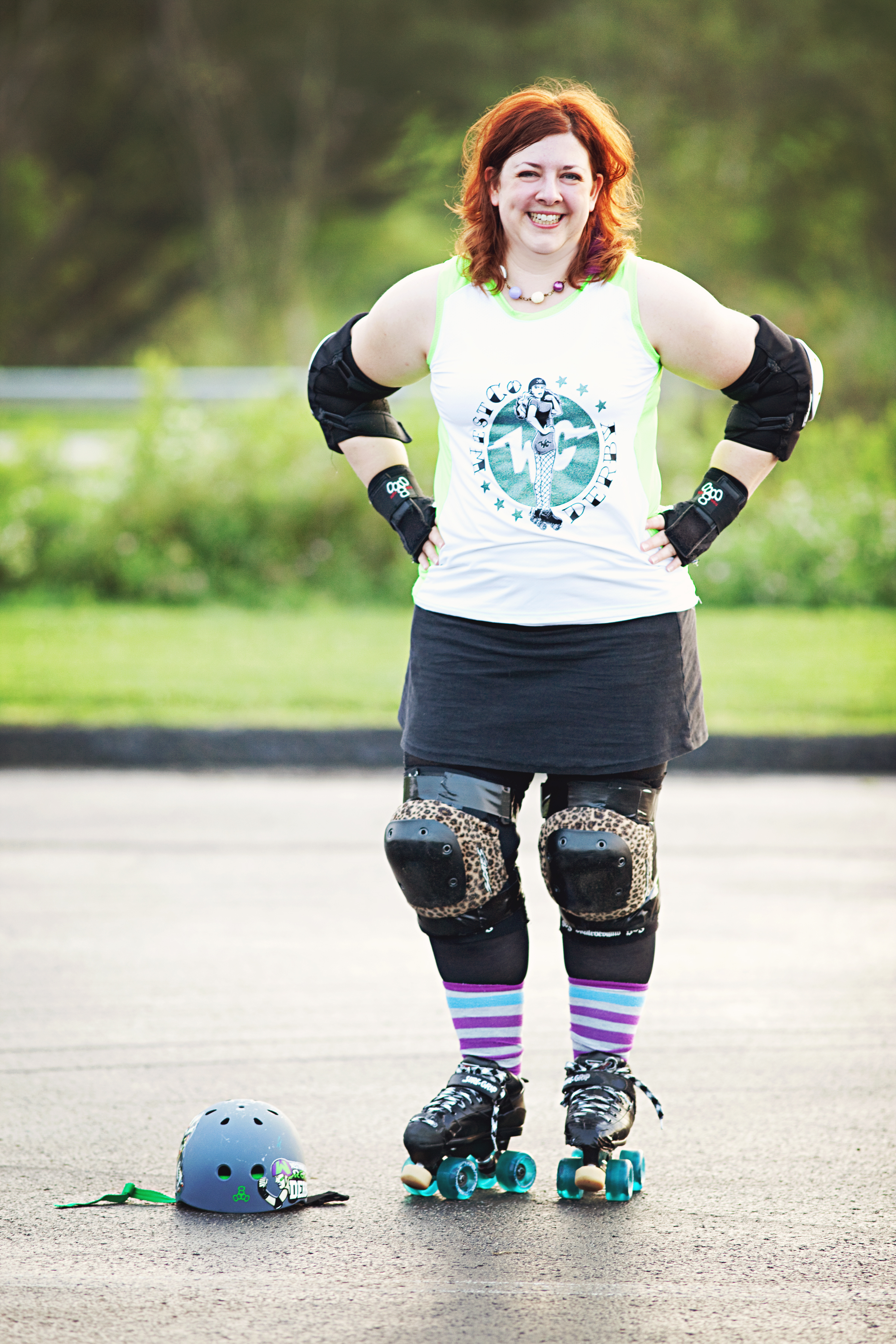 credit: www.photosbytabi.com
credit: www.photosbytabi.com
This essay was originally delivered as an onstage story at the Soulsisters Conference in Portland, Oregon, in October 2013.
** ** **
When I saw my first roller derby bout, I had no idea what was happening.
This was in the spring of 2010, and the movie "Whip It" had come out the year before. I hadn't seen the movie yet, but it had put the concept of roller derby in the periphery of my consciousness. The sport seemed funky and interesting, so when I discovered that there was a derby league in Pittsburgh, about an hour from my house, I decided to check it out.
Derby isn't the easiest sport to follow the first time you see it. Teams play offense and defense at the same time, and things move fast. So I had no idea what was going on during that bout, but I was fascinated. Here were these grown women on old school roller skates, wearing all sorts of protective gear – helmets, mouthguards, knee and elbow pads, wristguards – all skating around in a pack, shouting at each other and knocking each other down. It was crazy. The women had skater names such as Hurricane Heather and S'not Rocket Science. There were women of all shapes and sizes: tall and willowy, short and curvy. Women who were built like brick houses or more like pixies. Women with athletic bodies and others with bellies and booties that resembled my own well-rounded assets. But all of them were so confident, so fierce, so athletic.
I was so quiet while taking all of this that my husband turned to me at one point and asked, "Are you bored?"
"No," I said.
I paused for a moment and then said, very quietly, "I'm going to do this some day."
As soon as I heard those words leave my mouth, they felt equal parts impossible and undeniable. Impossible because I hadn't roller skated in 20 years. I was out of shape, had never played a sport, hated to sweat, and was supremely uncomfortable doing physical activity in front of people. Just the idea of going to the gym had been known to give me panic attacks. I didn't even like to go to the local walking track. But I couldn't deny that I'd said it – and that I'd meant it.
So when I tell you that I had no idea what was going on during that first bout, I mean it in several ways.
Consciously, I was trying to wrap my head around the rules of the game. But on a deeper level, my whole concept of who I was and what was possible was being dismantled and rearranged.
Fast forward two years to the spring of 2012. By this time, I'd seen the movie "Whip It" (which is, in hindsight, not the most accurate depiction of the sport), and had attended just one more bout. I did briefly consider trying to join that league in Pittsburgh, but they practiced and played more than hour from my house, and I wasn't willing to commit to that kind of commute just yet. Besides, I was 36 years old, out of shape, had weak ankles, and, let's face it: Who was I kidding? I wasn't the roller derby type.
But then I saw a flyer at my local coffee shop, announcing that roller derby was coming to my neck of the woods. A new league was forming a few towns over from me, and they were recruiting skaters of all skill levels – including my particular level of no skill whatsoever.
I tore off one of the flyer's little strips with contact info. I emailed for details. And then I waited two more months before getting on skates. All during those two months, I kept telling people that I was going to try roller derby. I kept saying it until I finally realized that I either had to stop saying it or ante up and do it.
First I tried skating on my own in a pair of rental skates and with no protective gear. This landed me a bruised or broken tailbone. After letting that heal for a few weeks, I was finally ready to attend my first official practice. It was the day after April Fool's Day, which struck me as fitting. This whole idea of me playing roller derby seemed like a weird practical joke I was playing on myself. Everyone else had trouble believing it, too. In fact, when I told my own mother, a supportive and kind woman, that I was going to a roller derby practice, she asked, "To watch?"
I said, "No, I'm going to try to play."
And my mother – my sweet, kind, and supportive mother – laughed.
"Oh, okay!" she said. "Right!"
She truly thought I was joking. And here's the thing: I wasn't even offended. I knew how absurd it sounded coming from me. I laughed, too.
But I went to that first practice. And then I went to another and another. I surprised myself and kept going. I went when I was scared (which was most of the time), when I was tired, when I was convinced people would laugh at me behind my back. I learned how to be in my body. I learned how to skate. I learned how to sweat. I learned how to fall down and how to get back up again. The first time I skated in a practice bout I had no idea what was going on. But over the past two years I've learned the rules of the game. I've learned how to pretend that I'm fierce and confident, even when I'm terrified. I've learned the magic of practice. I've learned what's possible.
Fast forward another two years to 2014: I put on my old school roller skates, my helmet, my knee-pads. I put on my team shirt with my derby name on the back (Punchberry Jam) and I skate around in a pack. I shout to my teammates. I use my body (and my booty) to block opposing skaters. I knock people down. I fall, and I get back up again.
Now, when I tell people that I play roller derby, many of them laugh and say that I can't believe it. I just smile and say "Neither can I."
10) Lessons from Roller Derby: Push yourself, but don't make yourself sick.
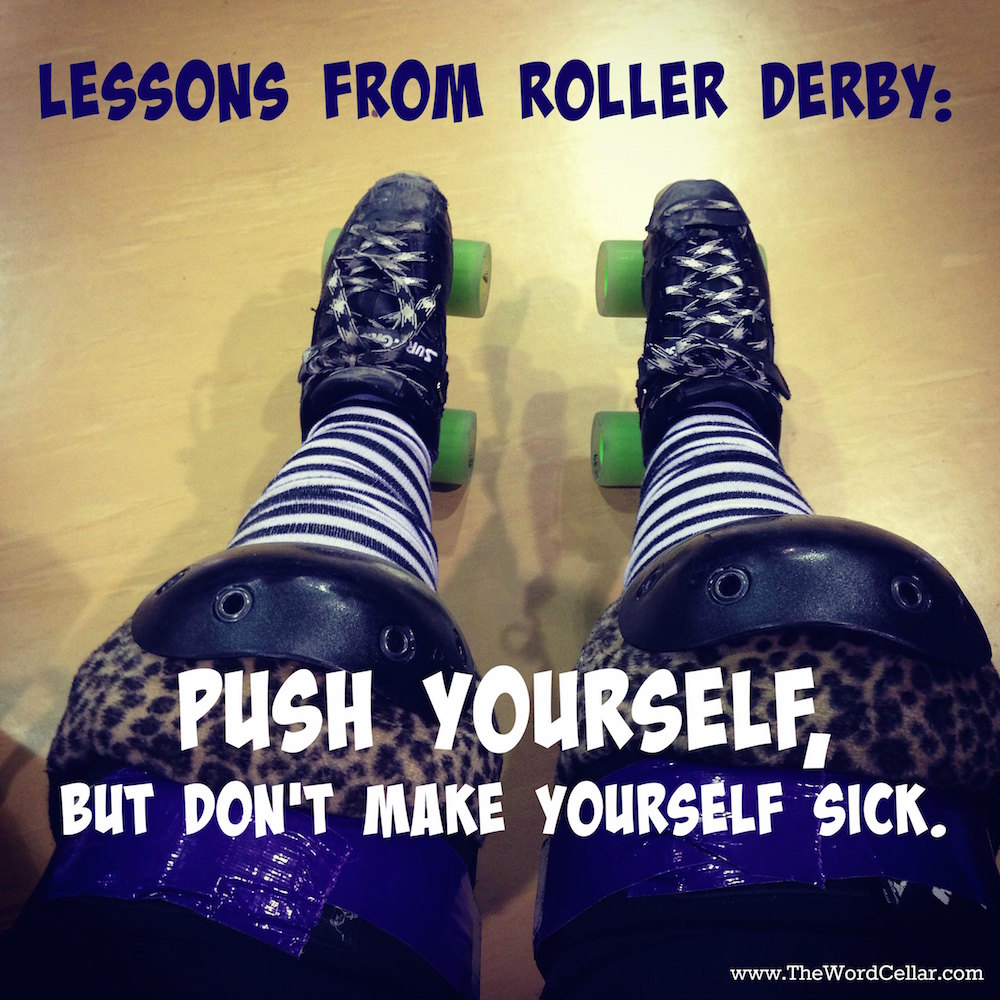
Tonight at roller derby practice, I wanted to sit down. My legs hurt, my back hurt, my feet hurt. If I let myself think about it too much, even my pride hurt. I've been skating for three years, but I've recently changed leagues and decided to do their "fresh meat" training program for new skaters. It's been great. The people are great, the training is great, and I'm making great strides.
But it's hard and humbling to admit that even after several years of doing this crazy sport, I still need a lot of work on some of the basics. I especially still need to work on my endurance. At one point tonight, one of the trainers asked me, "Are you okay?" In fact, I wasn't quite okay. I'd reached the limits of my physical endurance and felt like I was going to be sick. It must have registered all over my face (and all over how slow I was to get up for the next set of laps). When I confessed to feeling like I might yak, the trainer told me to rest for a minute. "I want you to push yourself," he said. "But I don't want you to make yourself sick."
So I sat out one set of laps and the worst of the nausea passed. And then I got back to it, even though I was tired and sore. And then when I hit that same point again, I got a drink of water, caught my breath, and got back on the track, still tired, still sore, but still in the game (so to speak).
I could write a lot about why roller derby is hard for me, about why it still feels like the craziest (and one of the best) things I do. (Oh, wait, I have written about that stuff.) But tonight, what I'm really thinking about is this idea of pushing yourself, but also knowing when to pull back and regroup. It's such a handy lesson for all of life. Do the thing you think you can't do, but know when to rest. Go all in, but know when you need to scale back a bit so you don't get hurt.
I'm also thinking about how there should be no shame in getting back to basics, even when it's for something that you've been doing for years. I think a lot about how this relates to writing. A lot of the clients in my writing apprenticeship program feel like they missed out on learning writing basics in school. I hear the same thing when I edit manuscripts for writers. So many of us worry that because we can't diagram sentences we can't be a writer. Learning grammar is hard and uncomfortable for a lot of people. I tend to understand the rules of grammar intuitively, which means that I sometimes have to look up the technical terms for things. Even after all these years of writing professionally, creatively, and academically, I have to go back to basics.
There's more to writing than grammar, of course. Sometimes I have to go back to the basic of remembering to schedule time to write, or the basic of reading like a writer, or the basic of simply writing first and worrying about revision later. The basics are the foundation upon which we build everything else, whether it's in skating or writing or cooking or cleaning or being a good friend. And there's no shame in that.
This isn't the most elegant blog post. It's, well, kind of basic, I suppose. But it's 1:45am and I still need to take a shower to wash off the derby funk, so that's about all I have for you tonight:
Push yourself, but don't make yourself sick.
There's no shame in going back to basics.
Those seem like pretty good mantras to me.


